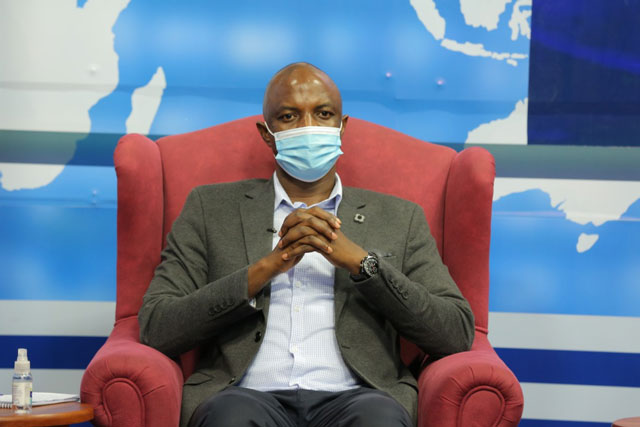
Kampala, Uganda | THE INDEPENDENT | Power has finally been handed to Makerere University Business School don and critic, Ramathan Ggoobi, who describes himself as a pragmatist and a proponent of economics that works.
Ggoobi was on Thursday appointed Permanent Secretary of the Ministry of Finance and Secretary to the Treasury after dancing on the edge power for some weeks.
A day before Museveni announced his new cabinet last month, The Daily Monitor leaked a purported list of cabinet nominees, and Ggoobi had been tipped to be Minister of Finance. But when Museveni finally released the cabinet list, he retained Matia Kasaija.
Ggoobi described the 24 hours from when The Daily Monitor tipped him to the time the cabinet list was released as interesting. “I enjoyed power for 24 hours, there were very many encouraging messages and when the list came out, all of a sudden, I lost the power,” he said on UBC TV’s Wednesday ‘Behind The Headlines’ programme where he is a panelist.
Ggoobi said those 24 hours taught him the kind of life that politicians go through and why it’s always a life and death battle for those in office to stay. As he takes office, it is the future that will tell if he will also fight hard to stay as long as the man he is succeeding, Keith Muhakanizi who has been in office for almost a decade.
Ggoobi is said to have been Operation Wealth Creation -OWC’s chief economist and was part of the team that drafted the National Resistance Movement -NRM 2021-26 manifesto. Thus, he comes at the right time to implement a document he co-authored.
Project implementation
In his writings over the years and regular appearance in print and broadcast media respectively, Ggoobi has divulged his philosophical thoughts and diagnosis of Uganda’s economic problems. On numerous occasions, he has argued that Uganda’s number one problem is poor implementation policies, strategies and laws.
“NRM/NRA has written very good papers over the years, the challenge has always been the quality of implementation,” he argued on May 12th, a day after Museveni took oath for a sixth term in office.
Ggoobi authored a paper titled “From Paper to Practice: Implementation of Uganda’s Industrialization Agenda” which was published by Friedrich Ebert Stiftung (FES) Uganda Country office in 2019.
Government projects, he argued, are derailed by weak decision making in ministries, departments and agencies. He gave a scenario when for instance, a commissioner in a ministry can’t make a simple decision, forwarding the issue to director who forwards it to the permanent secretary. The permanent secretary forwards it to a minister to take it to cabinet and cabinet leaves it to the president who would also want to first consult electorates before making a final decision.
Ggoobi described these delays, which would normally kick-start the processes of transforming Uganda, as “silly.” And he insists they must be addressed for the country’s economy to move forward.
Corruption
“Corruption starts at the Ministry of Finance where projects are designed with extras; adding things that are not supposed to be there,” President Museveni said in May after the election of speaker and deputy speaker.
Ggoobi will enter office definitely aware that he is joining a ministry that’s been described as the ‘mother of corruption’ in Uganda. He will either change the ministry to accountability and serving the taxpayer or the ministry will change him – for the worse. Ggoobi faces the real challenge of being another inconsequential space filler.
Corruption has been a big spoiler of projects, and during the drafting of NRM manifesto, Ggoobi said recently, the issue was discussed at length with the president.
“It was agreed that beginning with this term, there should be minimum human contact in doing work,” he argued recently on UBC. “We must ensure that we implement e-government and e-procurement.”
Uganda, he argued, must deal with corruption, where highly paid civil servants reportedly connive with contractors to steal tax payers’ money when negotiating project costs. Ugandans are crying,” he said in May. “Why don’t we see big fish going to Luzira?”
On Wednesday, Ggoobi rose to the defence of Ministry of Health whose chief technocrats continue to face criticism from Ugandans who think resources allocated to it for fighting the coronavirus pandemic are just stolen. Ministry of Health officials, Ggoobi argued, should not be condemned before thorough accountability is done.
“You know in this country; they love more paper accountability than results,” he argued. “You would rather account on paper and when there are no results on ground. Then there are those who will show you results but perhaps they did not procure according to the PPDA and so on.”
Ggoobi goes on: “Once full accountability is done and anyone is found to have stolen money meant for treating or vaccinating Ugandans, such a person needs not even to be in our jails, such a person needs to be hanged.”
He thinks people who have power to influence public opinion should not be just making allegations and blowing things out of context.
Democracy works if economy works
After November 2021 protests triggered by the arrest of Robert Kyagulanyi when campaigning in Luuka district, Ggoobi argued, “Younger democracies like Uganda face challenges because they can’t sustain democracy.”
He argued that democracy works only well when the economy is working.
He pointed to research that there is no country which has sustained democracy beyond 12 years when its GDP per capita is less than $1,000.
“Poor countries don’t sustain democracy because it becomes so easy for whoever wants to manipulate the democracy to do so,” he said. “People stop voting for interests, and resort to voting for a few things such as food, T-shirts.
*****
URN
 The Independent Uganda: You get the Truth we Pay the Price
The Independent Uganda: You get the Truth we Pay the Price




Interesting article.
It however contains several editing and proofreading errors, e.g. there’s no program on UBC TV called “Behind Headlines.”
Thank you Ronald for the feedback. Refresh page, Corrections made.
Hmm, just another cog in the wheel from the same source.EPRC. If I was the appointing authority I would have placed my bet on Dr Fred Muhumuza.
Nothing personal but from Mr Goobi am expecting a lot of educated smooth empty talk.